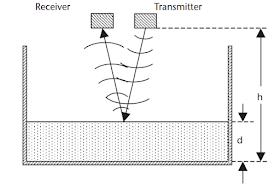Ultrasonic
or sonic waves are used in single or continuous level measurement of a liquid
or a solid. Ultrasonic waves are also called ultrasound.
Advantages of Sonic and Ultrasonic Devices
Sonic and ultrasonic devices are reliable, accurate and cost effective. They can be used in high humidity, they have no moving parts, and are unaffected by material density or conductivity.
Some of the disadvantages of these Devices includes:
Vibration or high noise levels can affect these devices. Dust can also give false signals or attenuate the signals by deposit build up on the transmitting and receiving devices.
Application
Note: Care should be taken not to exceed the operating temperature of the devices, and correction may be required for the change in velocity of the sonic waves with humidity, temperature and pressure.
Let’s consider
the following diagram:
A pulse of
sonic waves at approximately 10 kHz or ultrasonic waves at more than 20 kHz
from the transmitter is reflected from the surface of the liquid to the
receiver, and the time for the echo to reach the receiver is measured. The time
delay gives the distance from the transmitter and receiver to the surface of
the liquid, and from which the liquid level can be calculated. Since we know
the velocity of ultrasonic waves to be around 340 m/s, we can easily calculate the
round-trip distance from the transmitter to liquid level and back to the transmitter using
the formula: Distance=Velocity X Time
With round-trip
distance determined, we can determine the height of the liquid level using the Tank’s
height.
Since there
is no contact with the liquid, this method can be used for solids, corrosive
and volatile liquids.
You can also read:
You can also read:
Advantages of Sonic and Ultrasonic Devices
Sonic and ultrasonic devices are reliable, accurate and cost effective. They can be used in high humidity, they have no moving parts, and are unaffected by material density or conductivity.
Some of the disadvantages of these Devices includes:
Vibration or high noise levels can affect these devices. Dust can also give false signals or attenuate the signals by deposit build up on the transmitting and receiving devices.
Application
Ultrasonic
and sonic devices find common use in Food and Beverage industries where we have
liquid level measurement applications; they are also used in Water and wastewater, Pharmaceutical industries etc.
Note: Care should be taken not to exceed the operating temperature of the devices, and correction may be required for the change in velocity of the sonic waves with humidity, temperature and pressure.
Don't miss out on key updates, join our newsletter list here.

No comments:
Post a Comment